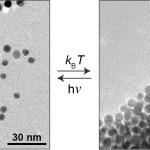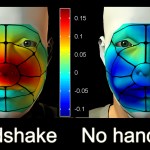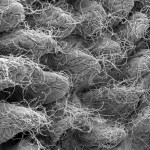Chemical communication
One day in the future, we may be treating our ailments with microbiotic combinations designed specifically to correct imbalances in our personal microbiomes. We’ll bring our prescriptions on rewritable paper and pay using shimmery optical chips embedded in our cell phone cases or maybe our jewelry. Or we’ll be waiting in our doctor’s office for a simple test of our microbiogenome to see if a light-based nanoparticle delivery treatment is working, while watching iridescent optical displays that change as we move...
These future scenarios (and many more) are all imaginary, but…
Today's guest blogger is Idan Frumin, a student in the group of Prof. Noam Sobel in the Neurobiology Department. Their research on the transmission of odor compounds while shaking hands appears today in eLife.
It all started one day after lunch, sometime back in 2011. We sat in the lab’s living room (Yeah, we have a living room. And a bedroom. And a blind pet cat. But that’s a different story), when Noam asked – ever wonder why people shake hands?
– To show you don’t have a saber up your sleeve – I immediately retorted.
– But that seems odd, doesn’t it? After all, we’re not in the…
Could artificial sweeteners be helping cause the very thing they are supposed to prevent? They may well do so, and you can probably blame your microbiota – those masses of mostly-friendly bacteria that live in your gut. According to a paper by Weizmann Institute scientists that appeared today in Nature, artificial sweeteners not only encourage the wrong kind of bacteria to expand their numbers, they also induce mix-ups in the cross-communication between these bacteria and your body. Those mix-ups can lead to glucose intolerance – the first step toward metabolic syndrome and diabetes. So,…
Some of the best moments in my job as a Weizmann science writer are the times when a scientist I'm interviewing slips in a finding that shifts my understanding of how the world works. Not long ago, for instance, I was speaking with a researcher about his work on phytoplankton. Now, the fact that phytoplankton release about half of all the free oxygen on the planet should be an eye-opener to anyone, and a reminder of the importance of ocean health. (But that wasn't the surprise.)
Dr. Assaf Vardi researches the chemicals that phytoplankton produce to communicate. Of course, all sorts of…



